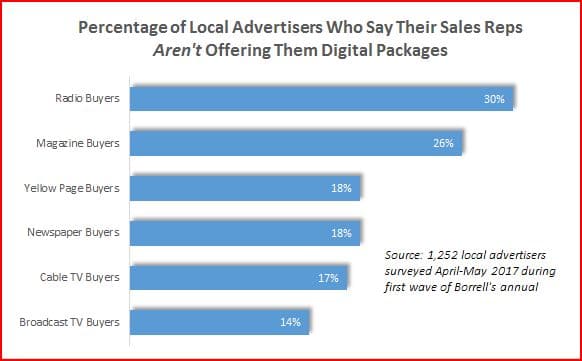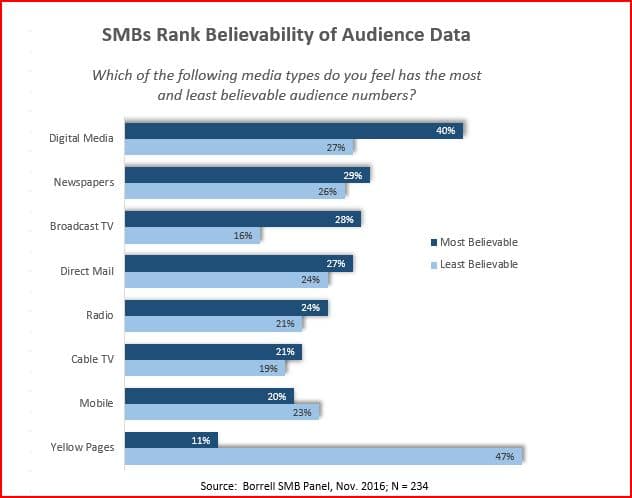
Borrell Associates released a comprehensive digital revenue study Wednesday called, “Benchmarking Local Media’s Digital Revenues.” In the stories that follow you’ll see how the digital monsters like Facebook and Google are snatching up all the money. You’ll also see how radio is fairing in the fight for the almighty digital dollar. To be frank, it’s not that pretty a picture, despite how some in the industry keep saying digital dollars are growing by double and triple percentages. Borrell says you get 1%….a measly 1%. So we turned to the head honcho at Borrell and Associates to ask the big question. Why? Here’s what Borrell & Associates CEO Gordon Borrell had to say.
Radio Ink: Why do you believe radio has not been able to take advantage of all that digital revenue? One percent is pretty bad.
Gordon Borrell: It’s pretty simple — they’re just not asking for the order as much as everyone else. There’s some data in our current survey of local advertisers, taken in April and May of this year, that proves it. It shows that, of all types of media reps, radio it pitching digital products the least. See below.
Radio Ink: What do they need to do better to get more of that ad pie?
Gordon Borrell: I could say something wholly expected like, “have the right digital products,” or “train the sales staff better.” But the real problem is that many radio chief executives do nothing but obsess about quarterly profits and act like they’re in some sort of competition to be the most-quoted Crusader of Radio. If more CEOs would read some of the data I’m seeing — the pulse of their most important customers, the advertisers — they’d wet their shorts and, hopefully, initiate a deeper drive to meet customers’ digital needs better. Most (but not all) executives in this industry are so far out of sync with what’s happening on the front lines that I worry that the industry will never get the same amount of insulation that TV, cable, and newspapers are getting from strong, built-in digital product offerings.
Radio Ink: If you could name three specific types of digital products local clients are using, what are they seeing the most success with?
Gordon Borrell: Social media (particularly Facebook) is at the top of the list for all types of advertisers. It’s inexpensive, targeted, and delivers immediate results. Search engine marketing has suddenly risen (again), so that’s No. 2. At No. 3, I’d say it’s delivering some type of creativity around digital — cool things to do in the digital space with a contest, event, or just a cool video that goes up on YouTube and on their Facebook page.
Radio Ink: There have been reports recently about how some advertisers are spending on digital without knowing if it’s even working and they were going to cut back. That really doesn’t seem to be the case, according to your study.
Gordon Borrell: It’s more of a hope of radio people than it is a reality among local advertisers. National advertisers are certainly rattling sabers, but local advertisers are not at all inclined to cut back their digital spending. In fact, 64% are telling us they plan to increase digital spending in 2017. When we look at the comments, we see the problem: They’re no more concerned about digital fraud than they are about the fluff in radio audience data, or TV metrics, or those ridiculous “readership” numbers that newspapers keep trying to push. Don’t shoot me — I’m just telling you what the advertisers are telling us. Check out the chart below. If you don’t believe the chart, then maybe you’re part of the problem.








yes “asking for the order” and having the right solutions and training are all critical.
I have firsthand experience with the problems you are addressing. The point you made about CEO’s not seeing past quarterly revenue and their inability to initiate advertiser’s digital needs was spot on. The General Managers and Market Managers I work with have such tunnel vision when it comes to digital products that they have trouble understanding the value it brings.
Bravo! If the right folks in the radio business really understood what digital reps (like myself, a former radio guy for 20 years) are selling (leads, calls, highly sophisticated, multi-component campaigns that optimize around actual results, deep understanding of ROI, incredible transparency and tracking) they’d start to wake up. Unfortunately, they’re still trying to attack digital on click fraud and impression numbers. That’s like radio crying about SiriusXM not being local; it’s not an issue anymore.
I have conversations with clients and prospects about cost per call, cost per sale, profitability, full funnel solutions, the customer buying cycle, the 3 S pyramid of search, surf and social, lead nurturing, digital presence, source attribution. We discuss tangible, measurable results. Digitally, radio is saying, “want an email or text blast with your spot buy? How about a banner campaign on the web?” There’s no in-depth conversation about a dozen distinct types of display advertising and the nuances of each. After a radio flight, the conversation is a hopeful “how’d it go? Here’s when your spots ran.” During a digital investment, the conversation is about quantity and quality of leads because the client and rep can see exactly (and listen) to the calls and inquiries generated. They can tweak campaigns and settings to better optimize around results. They can update landing pages and text ads, and so on.
So, yes “asking for the order” and having the right solutions and training are all critical. But more than that, the client experience and discussion is night-and-day. Compare it to opening a savings account vs. meeting with a financial planner.
Geo Fencing, Audience Targeting and Mobile need to be the solutions you lead with if you want more digital dollars.
One of the most frustrating aspects of trying to help radio sell digital (as a digital products provider) is that they don’t believe their OWN numbers. We have tons of medium and small market clients that have actually created 3-5 more digital traffic in the markets they serve, than any semblance of radio ratings (which are so under-sampled and irregular in most markets) could provide.
The real problem…is that Radio refuses to bundle. Radio desperately needs to stop trying to make digital a line item…and needs to become “multimedia” as opposed to “a terrestrial station with a digital package or two on the side.” Multimedia companies can sell the full reach of their products…bundled into a premium pricing model.
borrell = smart. again.